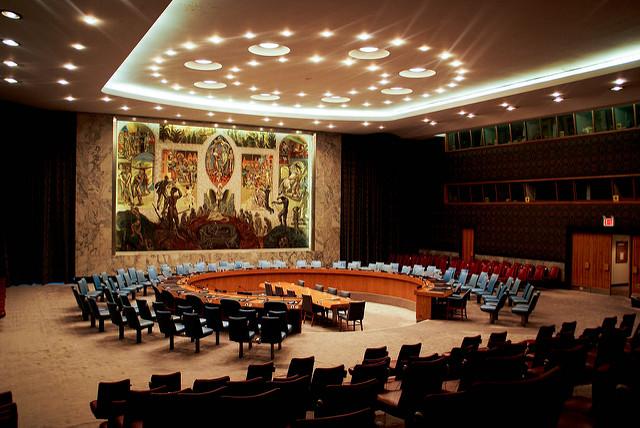Race for UNSC seats heats up (part 1)
Posted By Sarah Frankel on June 20, 2016 @ 14:30

Each year, five seats on the UN Security Council (UNSC) are up for grabs, and with them come an annual tradition of horse-trading, lobbying, and ‘swag bag’ gifting. This year is no different, though the elections have been moved up in the calendar and are somewhat more public than previously. Voting is scheduled for 28 June, and three of the five seats are contested:
- Bolivia and Ethiopia are each running uncontested
- Kazakhstan and Thailand are competing for one Asia–Pacific seat
- Italy, the Netherlands and Sweden are competing for two seats allocated to the Western European and Others Group
To win a seat, a country must secure votes from two thirds of UN member states present and voting (129 if all 193 members vote). The winners will join the Council on 1 January 2017 for a two-year term. With the vote coming up next week, let’s take a look at the UN’s shifting election procedures and how the races are shaping up.
Unpredictability and evolving election procedures
Successful UNSC bids often require intense and long-term diplomatic lobbying, and the results of contested elections are notoriously unpredictable for a variety of reasons. First, voting is conducted by secret ballot, leaving ambassadors unaccountable to both their pledges and their capitals. Australia’s former UN ambassador Richard Butler famously attributed [1] Canberra’s loss in 1996 to the ‘rotten lying bastards’ phenomenon. Second, UN delegates regularly base their votes [2] on exchanges of support or personal ties rather than on political issues. Finally, current events or shifting geopolitical realities can at times influence the outcome, which was most likely the case in Turkey’s surprising defeat [3] in 2014.
This year’s elections may be even more unpredictable than usual, given the new dynamics related to timing and transparency. Elections have traditionally taken place in October, but in an effort [4] to provide newly elected members with more time to prepare for their new role, the General Assembly decided to move the elections up to June. The move will also serve to improve the UN’s ability to respond to unexpected circumstances, such as Saudi Arabia’s withdrawal [5] after its election in 2013. In the past, UNSC candidates have capitalised on the ‘high-level week’ in September to lobby heads of state and government attending the UN’s General Debate, raising questions about whether the timing change has impacted campaign strategies or possible outcomes.
Additionally, candidates for the first time have participated in public debates [6] hosted by the World Federation of United Nations Associations (WFUNA). In a similar vein to the push for a more transparent UN secretary-general race, last month the five UNSC candidates involved in contested elections presented their platforms and answered questions from member states and civil society groups. Some observers have hailed the debates as a step forward [7] for transparency and accountability while others have suggested that the voting was locked up [8] long before the debates and that the UN’s tentative efforts at transparency risk [9] ‘giving the surface appearance of change while allowing business as usual to continue in the shadows’. It remains to be seen whether countries will incorporate the debate results into their decision-making for the vote or if they’ve already been swayed during the years of campaigning and horse-trading in advance.
Clean slate elections for Bolivia and Ethiopia
Bolivia and Ethiopia are running unopposed for seats on next year’s Council with the backing of their regional groups. Both countries have served on the UNSC twice in the past—Bolivia in 1964–1965 and 1978–1979 and Ethiopia in 1967–1968 and 1989–1990. Unlike their counterparts in the contested races, neither Bolivia nor Ethiopia has had to provide specifics on their goals for their tenure on the Council. Both, however, have also been invited by WFUNA to publicly present their candidacies, so we may still learn more.
UNSC seats for the Latin American and Caribbean Group (GRULAC) have been uncontested since 2008 based on an informal understanding developed among its members following 47 rounds of inconclusive voting between Guatemala and Venezuela in the 2006 elections. Bolivia is emphasising [4] the promotion of human rights, the protection of vulnerable people, and the need to address root causes of conflict. It’s interested in addressing environmental sustainability issues around peace and security and ensuring that the Council takes the priorities of all stakeholders into account. This seat is currently held by Venezuela.
African seats on the Council often are uncontested because the African Group maintains a tradition of rotation among its five subregions. Ethiopia is highlighting [4] its long track record of peacekeeping, from its first contribution in 1950 to its standing as of April as the single largest troop contributor to UN peacekeeping operations. Addis Ababa’s general priorities for its term on the Council include enhancing peacekeeping effectiveness, promoting greater cooperation between the UN and regional organisations, advancing disarmament and arms control initiatives, and promoting the link between development and international peace and security. This seat is currently held by Angola.
With those races locked up, part 2 will address the contested races and handicap the field.
Article printed from The Strategist: https://aspistrategist.ru
URL to article: /race-unsc-seats-heats-part-1/
URLs in this post:
[1] famously attributed: https://www.globalpolicy.org/component/content/article/196/39951.html
[2] base their votes: https://www.globalpolicy.org/component/content/article/196/39951.html#38
[3] Turkey’s surprising defeat: http://www.newsweek.com/venezuela-malaysia-angola-new-zealand-win-un-council-seats-277962
[4] in an effort: http://www.securitycouncilreport.org/atf/cf/%7B65BFCF9B-6D27-4E9C-8CD3-CF6E4FF96FF9%7D/unsc_elections_2016.pdf
[5] Saudi Arabia’s withdrawal: http://world.time.com/2013/10/18/saudi-arabia-rejects-seat-on-u-n-security-council-and-confuses-everyone/
[6] public debates: http://www.wfuna.org/wfuna-security-council-election-initiative
[7] a step forward: http://www.theguardian.com/global-development/2016/may/21/un-security-council-open-debate-big-step-forward
[8] voting was locked up: http://passblue.com/2016/05/25/civil-and-polite-nations-participate-in-first-ever-security-council-election-hearings/
[9] risk: http://blogs.cfr.org/patrick/2016/06/06/let-the-sunshine-in-increasing-transparency-in-un-elections/
Click here to print.